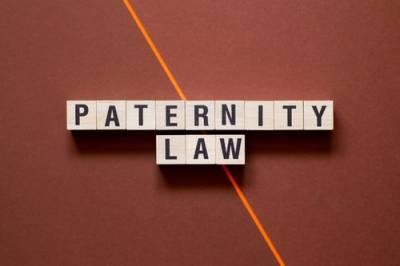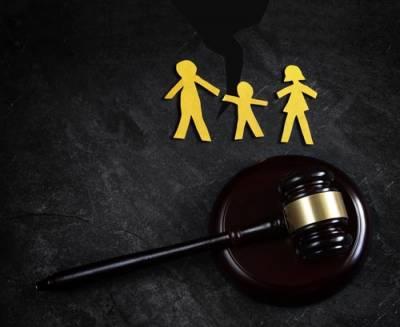Recent Blog Posts
How Can I Help My Children Cope With Holiday Stress During My Divorce?
 For many families, the winter months are filled with weeks of celebrations, time spent with loved ones, and meals gathered around the family table. At the same time, the holiday season can be abundantly stressful, especially for children whose parents are going through or who have already gone through a divorce or a separation. During the first holiday season after the separation, parents often face difficulty when it comes to bringing the magic of the season alive in their homes, but there are some things you can do to help.
For many families, the winter months are filled with weeks of celebrations, time spent with loved ones, and meals gathered around the family table. At the same time, the holiday season can be abundantly stressful, especially for children whose parents are going through or who have already gone through a divorce or a separation. During the first holiday season after the separation, parents often face difficulty when it comes to bringing the magic of the season alive in their homes, but there are some things you can do to help.
Managing the Holidays After Divorce
Here are a few things you can do to make the holidays easier for you and your children after your divorce:
-
Expect emotional reactions from your children. The first holiday season after your separation will likely be one of the hardest you will experience. While you may understand that the sadness that you feel during this holiday season will not last, your children may not. They may become frustrated, or they may not understand why things this year are different from years before. When you notice your child’s mood beginning to take a turn, try encouraging your child to talk about what they are feeling.
Important Provisions to Consider in Your Illinois Parenting Plan
 Some of the most contentious issues in a divorce are often the issues that revolve around the children, such as parenting time and decision-making responsibilities. Before a couple with children can divorce, they must come to a consensus on all of these issues and put their agreement in writing into what is called a parenting plan. If you and your spouse are able to come up with the agreement on your own, this can be extremely helpful in the long run. Keeping the negotiations between you and your spouse, rather than taking the issue to court, also allows you to personalize your parenting plan and include provisions that are specific to your family’s situation.
Some of the most contentious issues in a divorce are often the issues that revolve around the children, such as parenting time and decision-making responsibilities. Before a couple with children can divorce, they must come to a consensus on all of these issues and put their agreement in writing into what is called a parenting plan. If you and your spouse are able to come up with the agreement on your own, this can be extremely helpful in the long run. Keeping the negotiations between you and your spouse, rather than taking the issue to court, also allows you to personalize your parenting plan and include provisions that are specific to your family’s situation.
Items to Address in Your Parenting Agreement
Though you should further discuss your parenting plan with an Illinois divorce lawyer, here are a few things you should consider adding to your Illinois parenting plan:
Common Signs Your Child Could Benefit From Therapy During Your Divorce
 Divorce is no doubt one of the most stressful things a person can experience in their lifetime. Even for adults, coping with the stress of a divorce can be difficult, but for a child, it can be nightmarish. Children are not nearly as developed as adults are in any sense, whether that be emotionally, physically, or mentally. As such, children tend to have a much more difficult time coping and dealing with the impact of the divorce than their parents, especially if the divorce is particularly contentious. For many parents, the well-being of their children is the most important thing and at the top of their list of concerns, and if they are struggling to cope with your divorce, it may be beneficial for them to talk to a family therapist.
Divorce is no doubt one of the most stressful things a person can experience in their lifetime. Even for adults, coping with the stress of a divorce can be difficult, but for a child, it can be nightmarish. Children are not nearly as developed as adults are in any sense, whether that be emotionally, physically, or mentally. As such, children tend to have a much more difficult time coping and dealing with the impact of the divorce than their parents, especially if the divorce is particularly contentious. For many parents, the well-being of their children is the most important thing and at the top of their list of concerns, and if they are struggling to cope with your divorce, it may be beneficial for them to talk to a family therapist.
Signs That Your Children Are Struggling to Cope
Here are a few signs that may indicate that your children need help:
Useful Tips to Help You Survive Your High-Conflict Divorce
 Getting a divorce is rarely easy, but for some couples, the divorce process can be especially troublesome. It is normal for a divorcing couple to have disagreements, but when it seems as if the conflict will never cease, you can begin to feel worn down and burnt out. This can end up affecting not only your divorce case, but your physical and mental health, too. In many cases, a high-conflict divorce is the product of a high-conflict spouse. Often, it is possible to predict whether or not your spouse is likely to be combative or difficult to work with during your divorce process, allowing you to prepare yourself emotionally, mentally, and practically.
Getting a divorce is rarely easy, but for some couples, the divorce process can be especially troublesome. It is normal for a divorcing couple to have disagreements, but when it seems as if the conflict will never cease, you can begin to feel worn down and burnt out. This can end up affecting not only your divorce case, but your physical and mental health, too. In many cases, a high-conflict divorce is the product of a high-conflict spouse. Often, it is possible to predict whether or not your spouse is likely to be combative or difficult to work with during your divorce process, allowing you to prepare yourself emotionally, mentally, and practically.
Managing the Divorce Process With a Difficult Spouse
If you are going through a high-conflict divorce, here are a few ways to help you survive:
Can I Contest the Paternity of a Child in Illinois?
 Over the years, there have been many significant advancements in law and society when it comes to recognizing different family situations. For example, same-sex marriage was not only frowned upon but was illegal in many parts of the country for hundreds of years until a 2015 Supreme Court ruling. Unfortunately, there are also many ways that the laws still reflect traditional family structures. For example, Illinois generally presumes the father of any child born to a married mother to be the mother’s husband, though there are many situations in which this may not actually be the case. If a person wants to contest the paternity of a child, it is possible but it can be difficult, which is why hiring a paternity lawyer is recommended.
Over the years, there have been many significant advancements in law and society when it comes to recognizing different family situations. For example, same-sex marriage was not only frowned upon but was illegal in many parts of the country for hundreds of years until a 2015 Supreme Court ruling. Unfortunately, there are also many ways that the laws still reflect traditional family structures. For example, Illinois generally presumes the father of any child born to a married mother to be the mother’s husband, though there are many situations in which this may not actually be the case. If a person wants to contest the paternity of a child, it is possible but it can be difficult, which is why hiring a paternity lawyer is recommended.
How Do I Contest Paternity If I Am Married?
When a child’s mother is married when the child is born or within 300 days before the child was born, the person the mother is or was married to is legally presumed to be the father of the child. Establishing paternity is a crucial step in solidifying a father’s rights to his child, but it also means that a legal father will be held to certain parental responsibilities, like child support, in the event of a divorce. If a man learns or suspects that he is not the biological father of his wife’s child and wishes to contest his paternity, he must take swift legal action, or the judge could choose to deny his petition.
Can Supervised Parenting Time Be Required in Illinois?
 Getting a divorce brings about many changes to your everyday life, which can be especially true if you are a parent. One of the biggest and most difficult changes to cope with for many Illinois divorcees is how much less time they get to spend with their children. In Illinois, the default is to allow both parents to have unrestricted parenting time with the child, unless there is strong evidence that unrestricted parenting time would be harmful to the child’s physical or emotional and mental well-being. If restrictions are required, a common example is requiring the parenting time to be supervised.
Getting a divorce brings about many changes to your everyday life, which can be especially true if you are a parent. One of the biggest and most difficult changes to cope with for many Illinois divorcees is how much less time they get to spend with their children. In Illinois, the default is to allow both parents to have unrestricted parenting time with the child, unless there is strong evidence that unrestricted parenting time would be harmful to the child’s physical or emotional and mental well-being. If restrictions are required, a common example is requiring the parenting time to be supervised.
What Does Supervised Parenting Time Look Like?
According to the Illinois Marriage and Dissolution of Marriage Act (IMDMA), supervision during parenting time simply means that there is a third party present during the parenting time of the parent in question. Typically there are two types of “supervisors” or third parties that are often used in supervised parenting time cases:
Recognizing the Symptoms of Parental Alienation During Your Illinois Divorce
 Divorcing with children means you must pay attention to and come to an agreement on a slew of additional issues other than your usual divorce topics. Making decisions and coming to a consensus on things such as parenting time agreements and child support payments with your spouse can seem like you are running a marathon, especially if you and your spouse are not on the friendliest of terms. In some cases, the child can even become stuck in the middle of the parental conflict and become a victim of parental alienation. This type of parenting behavior can be harmful to your child’s wellbeing, which is why you should take action at the first sign of alienation.
Divorcing with children means you must pay attention to and come to an agreement on a slew of additional issues other than your usual divorce topics. Making decisions and coming to a consensus on things such as parenting time agreements and child support payments with your spouse can seem like you are running a marathon, especially if you and your spouse are not on the friendliest of terms. In some cases, the child can even become stuck in the middle of the parental conflict and become a victim of parental alienation. This type of parenting behavior can be harmful to your child’s wellbeing, which is why you should take action at the first sign of alienation.
What is Parental Alienation?
In the simplest words, parental alienation occurs when one parent attempts to damage the relationship between the other parent and their child. The alienating parent will display unjustified negativity toward the alienated parent, with the intent that the child’s emotions will turn against that parent. Not only is parental alienation extremely stressful and emotionally painful for the alienated parent, it causes emotional distress for the child and is actually considered by most mental health professionals to be emotional abuse.
Do I Need to Request and Use Subpoenas During My Divorce?
 Even if you have the best of intentions going into your divorce, you can still end up going through a contested divorce if your spouse decides he or she will be combative. Many times, you will know when your spouse is going to be difficult about certain issues in a divorce. In some cases, your finances can be the point of contention in your divorce and the source of much of the tension and disagreement. Some people end up needing to use subpoenas during their divorce cases and some do not; the majority of that depends on how cooperative your spouse is when it comes to the discovery process and dividing your assets.
Even if you have the best of intentions going into your divorce, you can still end up going through a contested divorce if your spouse decides he or she will be combative. Many times, you will know when your spouse is going to be difficult about certain issues in a divorce. In some cases, your finances can be the point of contention in your divorce and the source of much of the tension and disagreement. Some people end up needing to use subpoenas during their divorce cases and some do not; the majority of that depends on how cooperative your spouse is when it comes to the discovery process and dividing your assets.
The Discovery Process and the Role of Subpoenas
The discovery process is the formal exchange of financial information between the two spouses during a divorce. In some cases, this process does not even have to happen because both spouses are able to be fair and reasonable when it comes to asset division. However, in most cases, especially complex divorce cases, the discovery process is essential for uncovering all relevant financial information and documents. This is also typically when you or your attorney would request and draft any subpoenas for documents that you may need. You are permitted to subpoena people as well, but it is rare that you need to subpoena a witness in a divorce case.
Could a Temporary Financial Restraining Order Be Beneficial During My Divorce?
 There are many issues that a couple is bound to disagree on during a divorce. Some of the most common conflict-causing issues include child-related concerns such as allocating parenting time and decision-making responsibilities, whether or not you receive spousal maintenance, and what to do with the family home, among others. The most notorious issue that may cause conflict, however, is your finances. Just as finances tend to be a common cause of arguments and conflict in marriage, your finances can also be an area of concern in your divorce. A temporary financial restraining order can be a useful tool during your divorce and can actually protect your assets from being mishandled or wasted by your spouse.
There are many issues that a couple is bound to disagree on during a divorce. Some of the most common conflict-causing issues include child-related concerns such as allocating parenting time and decision-making responsibilities, whether or not you receive spousal maintenance, and what to do with the family home, among others. The most notorious issue that may cause conflict, however, is your finances. Just as finances tend to be a common cause of arguments and conflict in marriage, your finances can also be an area of concern in your divorce. A temporary financial restraining order can be a useful tool during your divorce and can actually protect your assets from being mishandled or wasted by your spouse.
Understanding Temporary Financial Restraining Orders
When you think of a restraining order, you probably think of a document that prevents one person from coming within a certain distance of another person or committing an act of violence against them. Though the subject of the two types of restraining orders are different, they both operate under the same principle of protection. With a financial restraining order, the goal is to protect your marital assets from being misused, destroyed, spent, transferred, or otherwise handled inappropriately by your spouse during your divorce.
Should I Get My Home Appraised During My Illinois Divorce?

When you have come to the decision that you and your spouse are going to get a divorce, you will likely experience a flood of different emotions, ranging from relief, sadness, depression, anger, and rage. While it may seem strange to experience such complex emotions, divorce is a complicated event that encompasses every area of your life. Once you reach the property division stage of your divorce, you and your spouse will be required to divide your marital property in an equitable manner, according to Illinois law. Your marital property includes anything that either you or your spouse took possession of during your marriage, including items like vehicles, the family home, and other real estate. Determining what to do with these assets -- especially the family home -- typically begins with an appraisal.







 630-364-4046
630-364-4046





